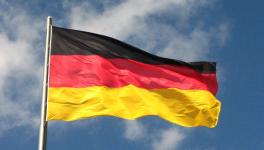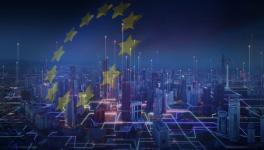Britain’s Exit from EU, Implications and Outcome
Britain’s decision to move out of the European Union has put the world economy in further darkness. The global economy faces slower growth as Britain’s decision to abandon the European Union threw financial markets into a tailspin and darkened the outlook for corporate and consumer spending.
Though the damage is likely to be concentrated on the other side of the Atlantic, experts said the repercussions would ripple across the world. The domino effect was on full display last week as the Dow Jones Industrial Average plummeted more than 600 points in one of the most harrowing days of trading this year. The drop was even more dramatic in Europe and Asia, where major stock indexes sank 7 percent or more. Newsclick interviewed D.Raghunandan on Britain’s exit from the European Union. Excerpts from the interview.
Rough Transcript:
Pranjal: Hello and welcome to newsclick. Today we are going to discuss about Britain’s exit from the European Union. To discuss the issue we have with us, D. Raghunandan from Delhi Science Forum and also a political commentator. Welcome to Newsclick, Raghu. So 52% population of Britain has voted for exit from European Union. What does Brexit mean and why do you think there was this trend in the public which has voted against the popular mandate of the politicians in the country?
D. Raghunandan (Raghu): First, to put it very simply, what this means is that the United Kingdom has voted to leave the European Union. So they would have to start proceedings to formalize this withdrawal which can be done in a variety of ways but in some form or the other, they will have to initiate this process and enter into a period of prolonged negotiations which will see them withdrawing from the European Union. They would have to negotiate trade agreements and tariffs and so on and so forth.
Pranjal: I think this period is around two years.
Raghu: It’s a two year, minimum sort of period but if there are some aspects which are left over, people say it can even stretch up to 6 to 7 years, some bits of it. But about two years is right, although European leaders last night seemed to suggest that they are keen on a quick divorce, rather than a long drawn out separation process. But politically, what I think this has meant, in terms of what the electorate has said and as you rightly said, the major political parties in the United Kingdom, the conservatives, who are of course very sharply divided on this issue, labour, and the liberal democrats, all had voted to remain inside the EU. But the electorate, particularly in England and Wails have voted to leave and that has been the dominant factor. Also the London metropolitan area and some of the big cities in England; Manchester, Liverpool, have even if marginally, voted predominantly to stay in. But it’s the smaller towns, the periphery as it were, the countryside, the rural areas, all of whom have voted by huge margins, 65 to 35 kinds of margins, to leave. Mostly because, the electorate in the United Kingdom has not seen the benefits of being with Europe. None of the political parties, the remained campaign was able to convince them that this is of advantage to you. Because the European Union has been largely seen as a distant entity, over which people have very little control and people in Britain were already exercised and disaffected by the fact that they also seem to have very little control over Westminster which was their own government. And here were the elites of Westminster trying to convince them to stay inside the European Union governed from an even more distant and more bureaucratic Brussels. This did not sway the British voters at all. On top of which, there is huge dissatisfaction, clearly visible in the electorate on several counts. The gradual collapse if you like, of the National Health Service, which has also been put under pressure by rising immigration from Europe, the collapse of other public services. All of this due to Neoliberal policies pursued by the British government but also pushed by the European Union political leadership. All in all, I would characterize this as a massive protest vote. It’s a protest vote against neoliberal policies; it’s a protest vote against capitalist globalization of which the European Union was seen as the main symbolic figure and it’s a protest against more and more distant political leadership which is unresponsive to people’s needs.
Pranjal: Impact of the Brexit was that the stock markets have crashed. So what impact is it going to have on trade, not only of Britain, but the major trading partners of Britain, the European Union and India itself?
Raghu: The stock market at present is showing signs of volatility. It’s likely to be volatile because this is a major political development, has thrown up uncertainties, and as you know, the market does not like uncertainties, will fluctuate. But I would expect the market to settle. Fluctuations will certainly come down, markets may settle lower than they are now which is again a factor playing into the negotiations. The Prime Minister yesterday, David Cameron indicated that he would step down sometime in September, that’s about three to four months away. And then Brexit will have to be negotiated by a new political leadership. Obviously the current political leadership represents the desire to stay in the European Union. The new political leadership clearly needs to be a Brexit leadership. It needs to be a leadership which is committed to taking the UK out of Europe and would therefore negotiate on that basis. Cameron clearly cannot do those negotiations. So, there would still be a period of uncertainty till September with considerable volatility in the markets and the two year negotiation period would also see uncertainties and therefore market uncertainty. However, in terms of trade I am not sure how much difference it is going to make, in the sense that whether it is a common market or not Europe will have to trade with the United Kingdom and the United Kingdom would have to trade with Europe. And the volumes of trade that the United Kingdom does with the United States on the one hand, with Asia on the other, with China, and with India, individually don’t amount to very much, in terms of percentages. Although the United Kingdom is the fifth largest economy in the world, its trade with these individual countries themselves are not extremely significant. So I would not personally expect to see great fluctuations or change in trade volumes in the immediate term. There may be some shifts that you will see in the medium term.
Pranjal: So, what would be the impact of the Brexit on the social indicators, like the National Health Service that you have been talking about? Will it lead to ending of these pro-people policies and a different type of regime that will come into place?
Raghu: See, the United Kingdom has been implementing neoliberalisation policies well before neoliberalism became a term and widely accepted; after all it was initiated by the conservative government of Margaret Thatcher, who was the pioneer in this. She was the one who first advocated rolling back the public sector, privatizing the public sector and gradually diluting national health and public education. These are policies pursued aggressively by the present conservative government as well. The new government that comes in, given the conservative majority in the House of Commons is going to be very similar. I don’t see how a conservative government led by whoever it is, a Brexit campaigner of any kind, is going to suddenly start re-pushing the National Health Service or making education free in the UK. In fact, if there are falls in trade volumes, if there is economic impact, there is very likely that the conservative government will put even more pressure on public services. So, I don’t expect to see any changes in that. And if tomorrow a labour party government comes to power, I doubt what they are going to do given the fact the new labour did not do much of a departure from the conservative policies earlier either.
Pranjal: Raghu, this exit would also leave a deep impact on the work force, the migrant work force. Around 1.2 million Brits are working in the European countries. What impact is it going to have on them?
Raghu: See there are two aspects that one needs to think about when you talk of migrant workers. One are the more than million and a half migrant workers from Europe who are working in the United Kingdom. And there are those from the United Kingdom, working in Europe. These are two very different social categories as well. Most of the workers from Europe who are working in the UK are semi-skilled or unskilled workers, working in construction, working in the hospitality sector, whereas most of the migrant workers from the United Kingdom working in Europe are professionals. And if you see the voting patterns, most of the professionals in UK; people with university degrees, people with higher education who would constitute those who travel to Europe for work are those who have voted to remain. Now obviously there will be an impact on those people if free movement of labour is not permitted under the new rules once Britain has exited from the European Union. The same thing applies to the migrant workers who have come in from Europe. They would also not be allowed free entry and back into the UK and this is certainly one of the major issues which is going to be negotiated, a major plank of the leave campaign run by both the conservative party and by the UK independent party, the far right party. One of their major planks was the European immigration, and there is a commitment by Cameron, to reduce immigration from three hundred thousand at present, down to the tens of thousands. If that is the case, then clearly a major objective of the post Cameron government, the Brexit government will be to see immigration numbers come down. Because this is what also much of the public who has voted leave, has wanted.
Pranjal: What has been the role of left parties, or left or the center parties in this entire campaign? And what impact is it going to have on the left movement across the Europe when we have seen countries like Greece and Spain that have over vehemently accepted the left parties?
Raghu: Broadly speaking, I would characterize the left as a whole, not just in the UK but in Europe as well, as having two main strands, differing strands of opinion with regard to the EU. The traditional left position has been, that the European Union is a capitalist project intended to serve the interest of the corporates and of the bankers of the financial sector and that therefore joining the European Union was not a policy friendly to the working classes and to the progressive movements. This has been the traditional position of the left. Many of the left, traditional left parties in the United Kingdom, the communist parties in Britain, in Northern Ireland, have therefore taken this position of supporting leave. The labour party however, supported the idea of joining the European Union way back in 1974 when the first referendum was held. But, interestingly the back bencher in the labour party then, who is the leader of the labour party today, Jeremy Corbyn, voted against the UK joining the European Union. The other opinion in the left has been, that the European Union has a whole represents a progressive force compared to the ultra nationalist, right wing forces and that therefore, it is in the interest of the left to join, or be part of the European Union and to reform the European Union as a whole towards more pro-people policies. This is the policy advocated by Varoufakis of Greece, for example and others. In the UK, Tariq Ali and the CPs have voted, have supported the idea of leaving the European Union. This is in terms of the left as we know it. The center left, the labour party, has always been in favour of going inside the European Union but have not done very much in pushing the European Union towards the left. The European Union today is dominantly a neoliberal force, putting pressure on all member states to privatize public entities, to privatize education, health and other public services, to implement austerity measures.
Pranjal: Greece, we have the biggest example
Raghu: Exactly. And the center left against which the Greek SYRIZA party, Podemos in Spain and many other protest left movements in Europe have come up, have come up against both the center right and the center left.
Pranjal: UK leaving European Union, what impact do you think is it going to have on other countries, those who have been wanting to leave European Union and have their own economic structures since long?
Raghu: the common people in the United Kingdom, the less educated, the less skilled, the provincial as against the metropolitan, are all today disenfranchised, impoverished, pushed down the social ladder and find it difficult to access public services in health and education. All these people have lost; have not gained anything from the globalization project and Europe today is seeing more and more of such classes of people, which is why you see the protest movements we’ve seen in Greece, and increasingly in Spain, in Italy, France, and many other countries. This is a rising tide and the UK exit is going to encourage those voices as well as the voices on the far right which emphasize nationalism and leaving the European Union for Nationalist, far right nationalist purposes. So, I think Brexit is going to have a catalytic effect, both on the right wing movements in Europe, as well as on the left protest movements. Both of whom campaign against globalization for different, if not opposite reasons.
Pranjal: Raghu, there was referendum in Scotland a year back which voted in favour of remaining inside the United kingdom. But now in this referendum both Scotland and the Ireland have voted to remain in EU while Wails has voted to go outside of the EU. So, what impact is it going to have on these entities and do you think there’s going to be another referendum in Scotland?
Raghu: Scotland and Ireland both have predominantly voted to remain in the European Union. Ireland with a 55 to 45 majority, Scotland with a 62 to 38 majority, that’s huge. And Scotland is rightly pointing to the fact that it is democratically unacceptable for the United Kingdom to choose to leave the European Union while Scotland by such an overwhelming majority, has voted to remain and to drag an unwilling Scotland to leave the European Union. So the leadership in Scotland of the Scottish National Party, the first minister, has made it fairly clear that she is keen on a second referendum in Scotland to join the European Union and to come out of the United Kingdom. The only thing is, the Scottish National Party has made clear earlier also after the narrow loss in the previous referendum that they would be keen on a second referendum but more or less when they are certain that they would win. They don’t want to have these repeated referendums happening. So I think we will see in the next year or so, a large public campaign by the SNP to trigger a large movement and demand inside the Scottish electorate and at the right time to go for a referendum. Ireland promises a slightly different trajectory, but somewhat similar. Northern Ireland shares a common border with the republic of Ireland which is a member of the European Union. So if Brexit is implemented tomorrow, border controls would have to be instituted between Northern Ireland and the Republic. How is that going to work? And that is going to revive the old Irish question, the troubles of the past, will come back to haunt Northern Ireland. The Sinn Fein party which campaigned for remain, and which won, and which is the political arm of the IRA has actually said that in Ireland too, in northern Ireland they would like to go for a referendum calling for a unified Ireland which has been the old position of the Sinn Fein. So I am fairly sure that Brexit here, of the United Kingdom leaving Europe is also going to see certainly Scotland leaving the United Kingdom and therefore the United Kingdom becoming, as some people have said divided Kingdom. Northern Ireland is also likely to pursue that, although the extent to which that happens given a fairly strong unionist presence there. The anomaly in all this is Wails, which has gone along with the disaffected working class of England to vote for leave. Incidentally, there is a fifth entity in the United Kingdom as well, which is the small island principality of Gibraltar, which has voted by the way 92% in favour of remain. There is going to be something happening in Gibraltar. The Spanish election which is taking place is pushing for joint sovereignty of Gibraltar shared between the United Kingdom and Spain and that’s a story we need to watch.
Pranjal: Thank you, Raghu for giving us your time and it looks like it’s going to get more complicated in the future. So we’ll be coming back to you on this issue. Thanks a lot. Thank you for watching Newsclick.
DISCLAIMER: Please note that transcripts for Newsclick are typed from a recording of the program. Newsclick cannot guarantee their complete accuracy.
Get the latest reports & analysis with people's perspective on Protests, movements & deep analytical videos, discussions of the current affairs in your Telegram app. Subscribe to NewsClick's Telegram channel & get Real-Time updates on stories, as they get published on our website.
























